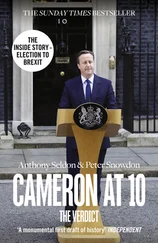
William Collins
An imprint of HarperCollins Publishers Ltd.
1 London Bridge Street
London SE1 9GF
www.harpercollins.co.uk
A William Collins Original 1996
Copyright © David Marquand and Anthony Seldon 1996
David Marquand and Anthony Seldon have asserted the moral right to be identified as the editors of this work
Set in Linotype Sabon by Rowland Phototypesetting Ltd,
Bury St Edmunds, Suffolk
All rights reserved under International and Pan-American Copyright Conventions. By payment of the required fees, you have been granted the nonexclusive, nontransferable right to access and read the text of this ebook on-screen. No part of this text may be reproduced, transmitted, downloaded, decompiled, reverse-engineered, or stored in or introduced into any information storage and retrieval system, in any form or by any means, whether electronic or mechanical, now known or hereafter invented, without the express written permission of HarperCollins ebooks
HarperCollins Publishers has made every reasonable effort to ensure that any picture content and written content in this ebook has been included or removed in accordance with the contractual and technological constraints in operation at the time of publication
Source ISBN: 9780006384496
Ebook Edition © JUNE 2016 ISBN: 9780008191931
Version: 2016-09-27
INTRODUCTION
Ideas and Policy
MORE YEARS have passed since 1945 than from the beginning of the century to that date. The major issues and questions in British history from 1900–45 are now fairly well established and there have been authoritative responses in many areas. In contrast, the historiography of the last fifty years is still in flux. A mass of scholarly literature has been written on particular policy areas, institutions and individuals. But the pattern and contours of post-war British history have been strangely hard to define. This is particularly true of the complex relationship between the world of ideas and the world of action. Some of the published literature refers in passing to the role of ideas, but for most authors it is very much a secondary concern.
Yet it is clear that the fifty years since the end of the Second World War have seen dramatic changes in the intellectual and cultural framework within which policy is made and implemented. The details of policy change, as well as the fluctuating fortunes of the political parties, reflect these broad changes in the subconscious of the nation and cannot be understood in isolation from them. The object of this book is to tease out the relationships between these dimensions of change. It explores the impact of transformations in the intellectual and cultural climate on the thinking and assumptions of policy makers, seeks to explain why ideas (such as privatisation or monetarism) which seemed beyond the pale in one period became the orthodoxy of another, and analyses the relationship between changing policy approaches and changes in the content of policy.
In doing so, The Ideas that Shaped Post-War Britain aspires to throw new light on the alleged shift from the collectivism of the post-war era to the individualism of the last decade and a half, and to place the Thatcher revolution and its aftermath, as well as the preceding thirty years, in a new and richer context.
Ideas, and the complex relationship between thought and action, provide the connecting theme of the book. However, our authors have approached the subject from very different angles. In the first chapter, David Marquand examines the rise and fall of Keynesian social democracy from the late 1940s until the mid-1970s, explores the New Right paradigm which dominated the following twenty years and speculates on the possible emergence of a third paradigm (which is itself the subject of the final chapter in the book). Marquand’s distinctive approach is to provide a subtler separation than that between individualism and collectivism, and to suggest that within each dominant phase were powerful cross-cutting political languages, at one time active and moralistic, at another passive and hedonistic.
Albert Hirschman, the seminal American political economist, next measures the British post-war experience against the propositions of two of his recent books, Shifting Involvements (1981) and The Rhetoric of Reaction (1992). Hirschman’s work is well known to social scientists in Britain, but historians have paid too little attention to it. His oeuvre provides the inspiration for several chapters that follow.
Chapters three and four provide the opportunity for two of our leading historians of economic thought to examine the impact of the ideas of Keynes, the single most powerful and influential thinker of the period, on post-war British history. Robert Skidelsky finds that Keynesian economics lost out in the 1970s to Friedmanism because the former failed to renew itself intellectually when it still held sway. A different perspective is provided by Peter Clarke in his chapter on the argument over macroeconomic policy in Britain since 1945. Robert Taylor in chapter five
explores another aspect of economic policy in his story of the uneven abandonment of the voluntarist tradition in British industrial relations.
The book then moves on to consider social policy. Jose Harris, the biographer of William Beveridge, the other main influence on post-war British history, examines the theoretical underpinning of the British welfare state as it emerged in the 1940s. Chris Pierson brings the story up to the present day in his chapter on the post-war welfare state. Social policy, he finds, by the 1990s was profoundly different to how it was conceived by Beveridge fifty years before. Raymond Plant examines the social-democratic tradition in British politics, grounding his analysis in the work of C. A. R. Crosland, before moving on to consider the neo-liberal reaction to it.
The book broadens out beyond economic and social policy at this point. Geoff Mulgan considers in chapter nine
British culture and its relation with society since 1945, while Jim Bulpitt explores the tortuous but central question of the motives for Britain’s changing stance on Europe in chapter ten
. In chapter eleven
, Anthony Seldon brings together the strands of the book in his analysis of the key turning points in post-war policy across a broad area, and weighs the relative influence of ideas, individuals, interests and circumstances in bringing about change. In the final chapter, Will Hutton explores some of the ideas behind ‘New Labour’. The book does not aim to be comprehensive. We are painfully aware that several key areas, such as environmentalism and feminism, have been neglected. The book is sponsored by the two organisations to which the editors belong, the Political Economy Research Centre and the Institute of Contemporary British History. The editors wish to thank colleagues at these bodies, especially Andrew Gamble and Sylvia McColm at the former, and Peter Catterall and Virginia Preston at the latter. They also wish to thank Annemarie Weitzel for her secretarial skills in bringing the book together, and Philip Gwyn Jones and Toby Mundy at HarperCollins for their enthusiasm and support.
David Marquand and Anthony Seldon, October 1996
CHAPTER 1
Moralists and Hedonists 1
David Marquand
[T]he ideas of economists and political philosophers, both when they are right and when they are wrong, are more powerful than is commonly understood. Indeed, the world is ruled by little else. Practical men, who believe themselves to be quite exempt from any intellectual influence, are usually the slaves of some defunct economist. Madmen in authority, who hear voices in the air, are distilling their frenzy from some academic scribbler of a few years back … [S]oon or late, it is ideas, not vested interests, which are dangerous for good or evil.
Читать дальше













